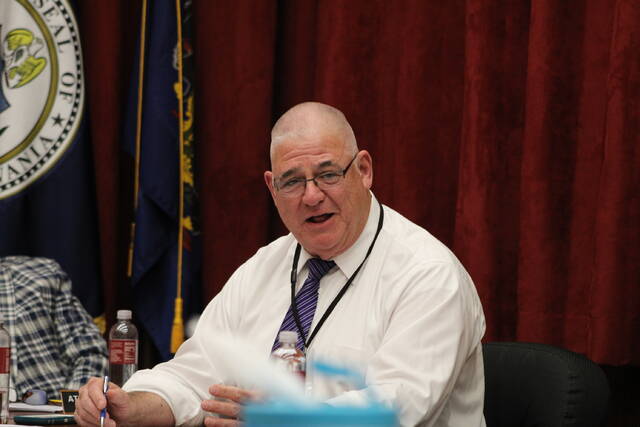Six of 11 Luzerne County Council members — a majority — said Monday they don’t support more protracted focus on another mail ballot drop box ordinance.
After hours of public comment and council debate last month, a council majority had voted against Councilman Stephen J. Urban’s proposed ordinance banning the use of county staff and resources to deliver mail ballot drop boxes to sites approved by the county’s independent citizen election board.
A key argument against passage was that the county likely would be sued because the election board — not council — has authority to decide whether drop boxes are used, officials had said. Urban had publicly acknowledged the election board’s authority over the use of boxes, saying that was why he did not seek an outright ban. Board members would still be free to deliver the boxes, Urban had said.
Now Councilman Brian Thornton is pushing for introduction of an ordinance that would outright ban drop boxes in the county.
Thornton said Monday he would be willing to spend county funds on litigation if necessary due to the importance of a ban.
“I’d be willing to go to court over that. The boxes will remain controversial with the public. It’s wrong and divisive and has split the county in half. The issue is constantly going to rear its ugly head,” Thornton said. “To move on, we have to get rid of drop boxes.”
The six council members who voted against Urban’s ordinance and are not in support of Thornton’s proposal: Vice Chairman John Lombardo, LeeAnn McDermott, Tim McGinley, Matthew Mitchell, Chris Perry and Chairwoman Kendra Radle.
McDermott said Monday a lawsuit is inevitable, and the county law office has made it clear council members don’t have jurisdiction over whether drop boxes are used under the county’s home rule government structure. Before home rule, the three elected county commissioners also served as the election board. The voter-approved home rule charter changed to a five-citizen election board.
Mitchell said drop boxes are a matter for the election board and state legislature to decide.
“With the number of pressing issues the county is facing and budget season approaching, we don’t have the time to be going through this issue again,” Mitchell said. “The taxpayers expect county government to move forward not backwards.”
Lombardo concurred, saying it is “essentially going over the same issue again.”
McGinley said it has been stated multiple times that the election board is responsible for deciding if drop boxes are used, and he said council should not be unnecessarily imposing uncertainty on the election bureau as it prepares for the Nov. 8 general election, which is now less than two months away.
For passage, ordinances require introduction and then majority vote at a subsequent meeting following a public hearing.
The county’s five drop boxes are scheduled to be set up around the time mail ballots are issued in mid October, the bureau said.
McGinley said council needs to concentrate on upcoming 2023 budget discussions, decisions about American Rescue Plan allocations and infrastructure projects.
Council members upset about drop boxes should push state legislators and the governor elected in November to address drop boxes through legislation, McGinley said.
Radle said it’s been made abundantly clear the election board has jurisdiction over the use of drop boxes.
“The whole reason Steve’s ordinance didn’t get rid of drop boxes is because they acknowledged they can’t get rid of them. Now they want to do just that,” Radle said.
Radle said she did not put Thornton’s proposed ordinance on Tuesday’s council agenda because the county law office determined the ordinance mirrors the one presented by Urban and cannot be reconsidered before council reorganizes again in 2024 unless one of the six who voted it down agrees to present it.
This reconsideration requirement is in council bylaws. Radle said none of the council members who voted against Urban’s ordinance came forward seeking a vote on Thornton’s new one.
Radle also said Thornton did not directly contact her to place the matter on the agenda, which she said has been the protocol. Council members have been unable to add new matters to the voting agenda the night of meetings due to a state law requiring advance public notice
Thornton vehemently objected to the exclusion of his proposed ordinance from the agenda for possible introduction requiring at least four votes. He accused Radle of “way overstepping her bounds.” He disagreed with the law office opinion that the reconsideration applies, describing the guidance as “flawed” and insisting his ordinance is different from the one proposed by Urban.
He reiterated many past complaints about drop boxes and said he believes the boxes violate a requirement for equal and fair elections statewide because 44 of 67 counties are not providing the option to voters.
While boxes were permitted through case law, Thornton said he does not believe they should be allowed unless legislators pass a law expressly authorizing them.
“The laws are already there. Why wait for the state to make new laws?” Thornton said.




